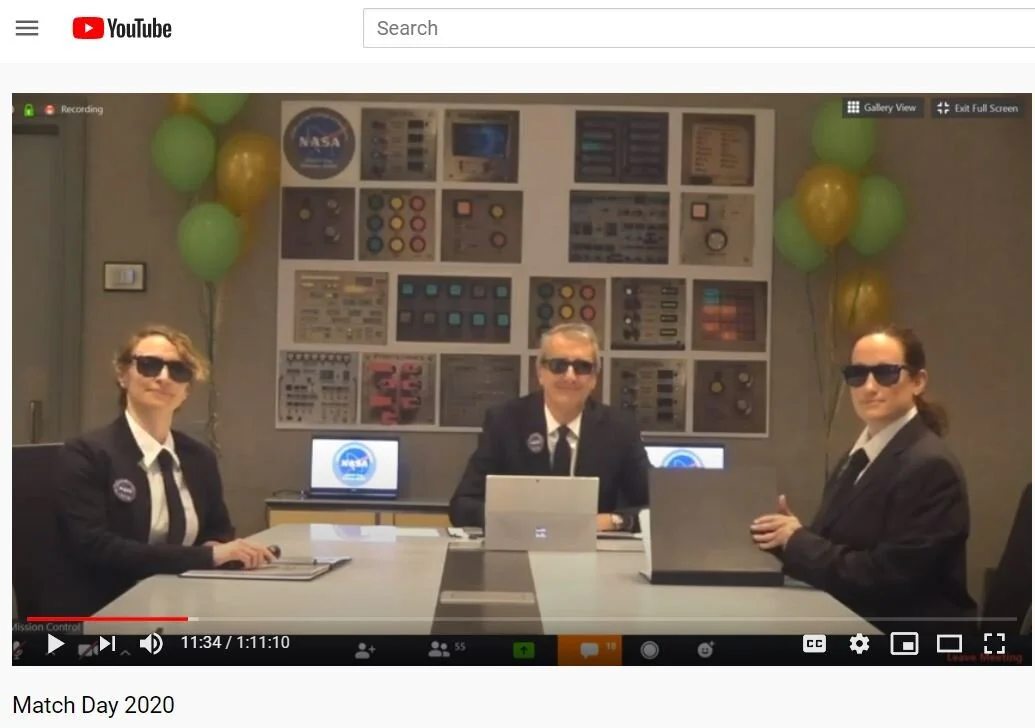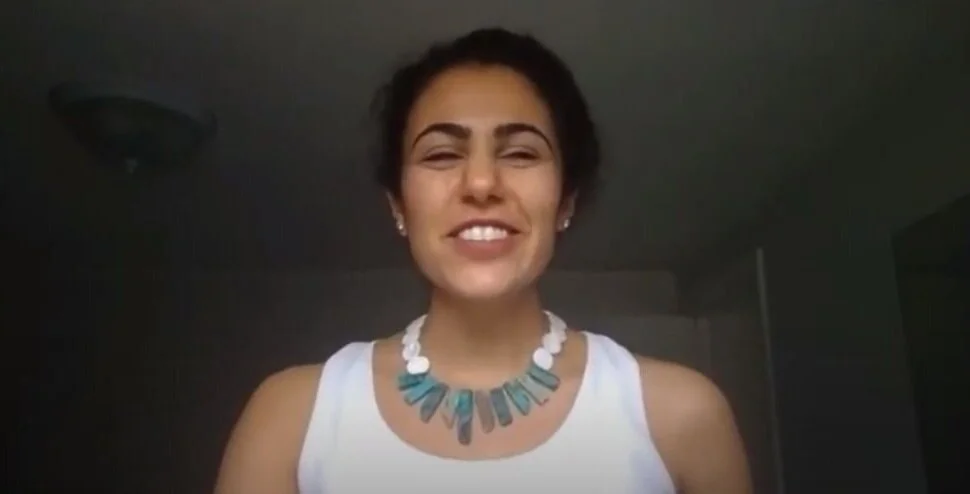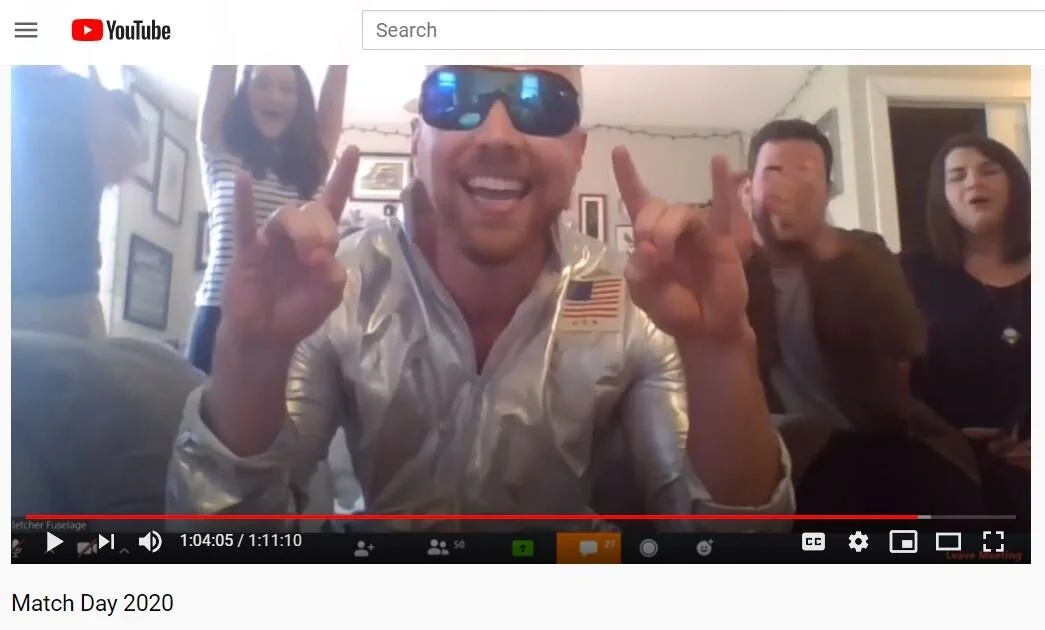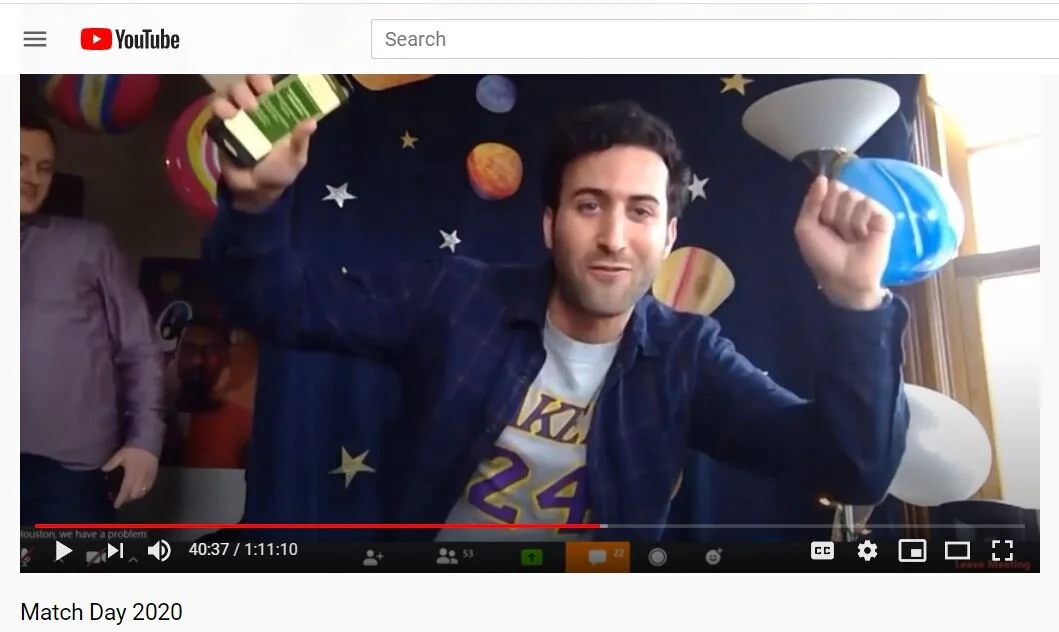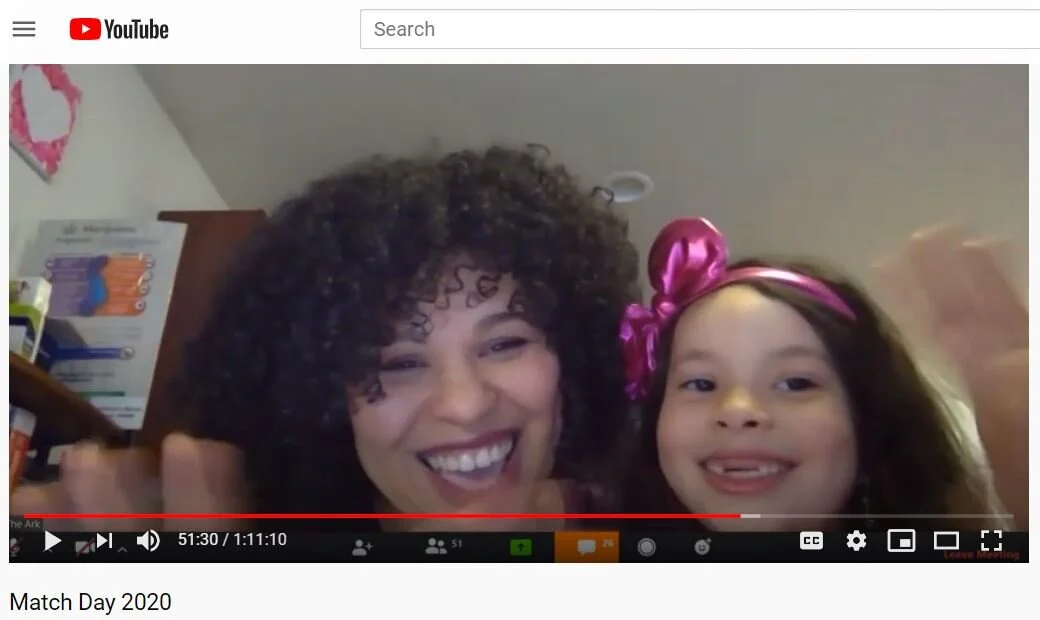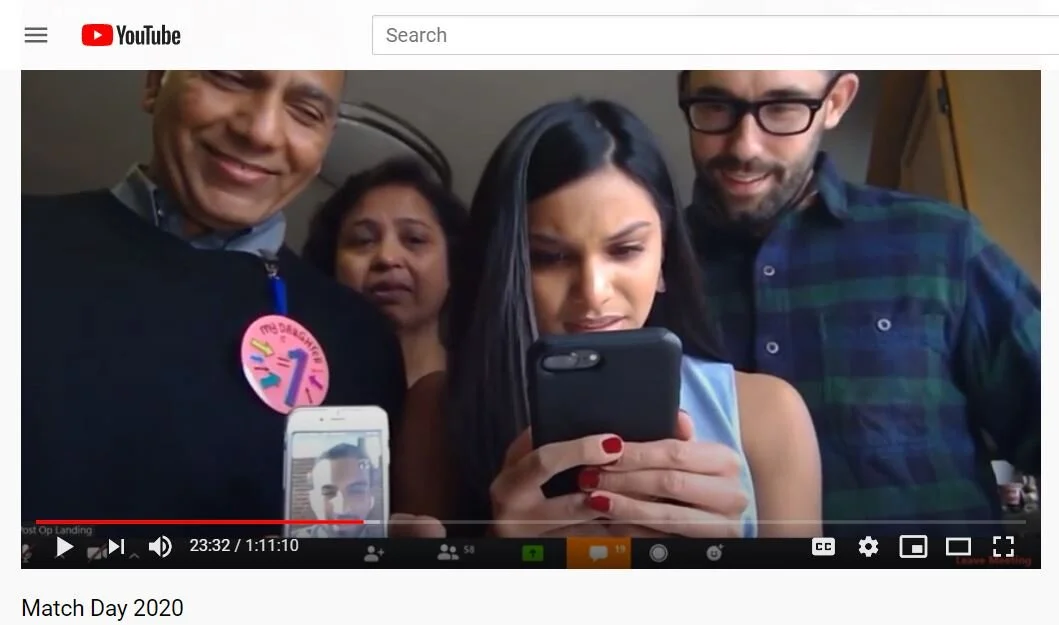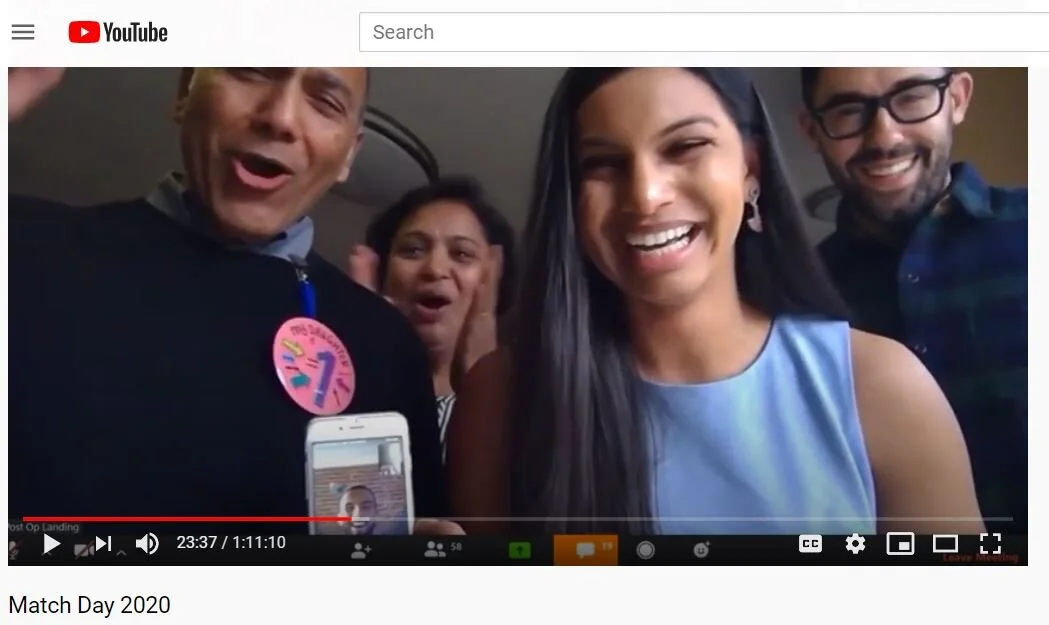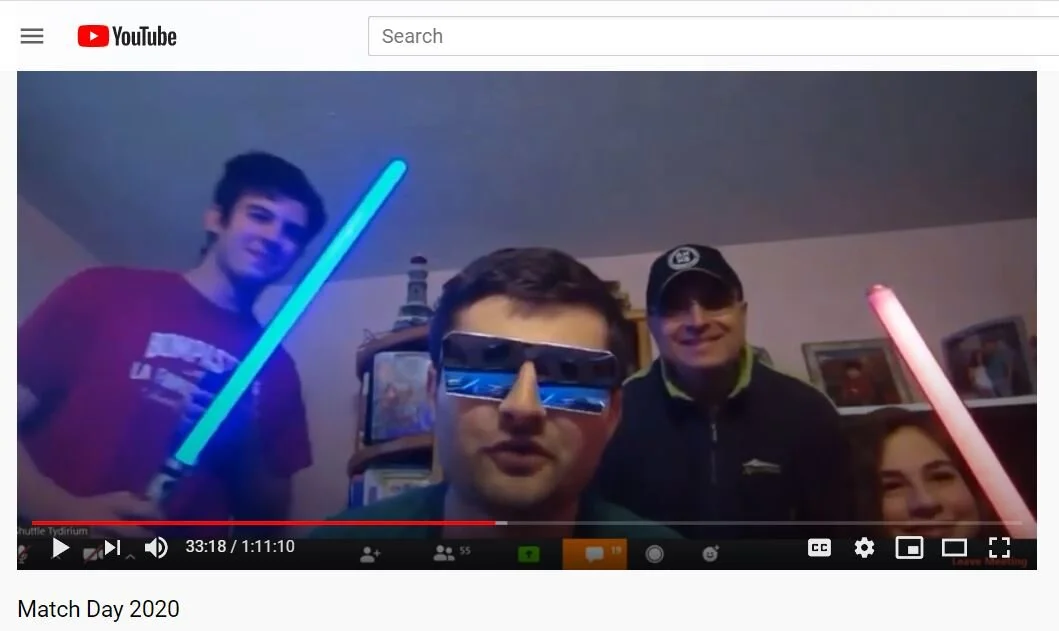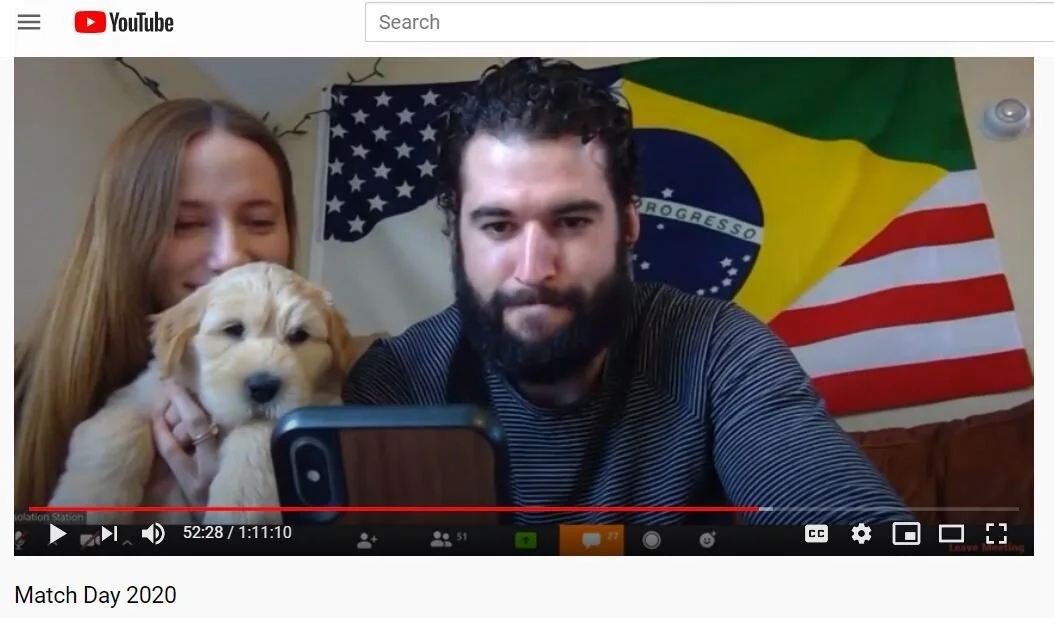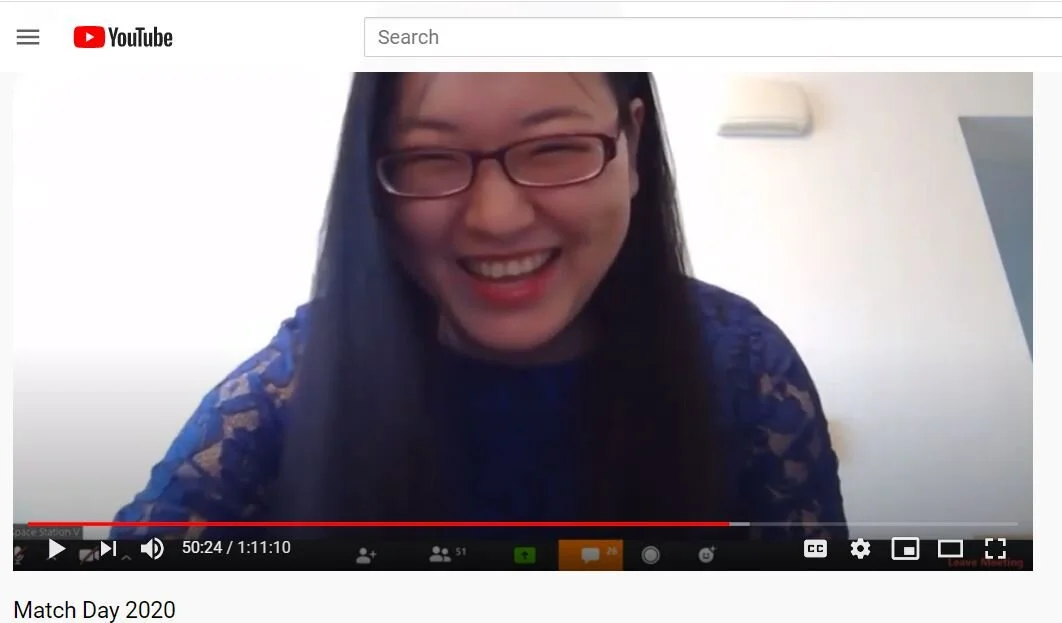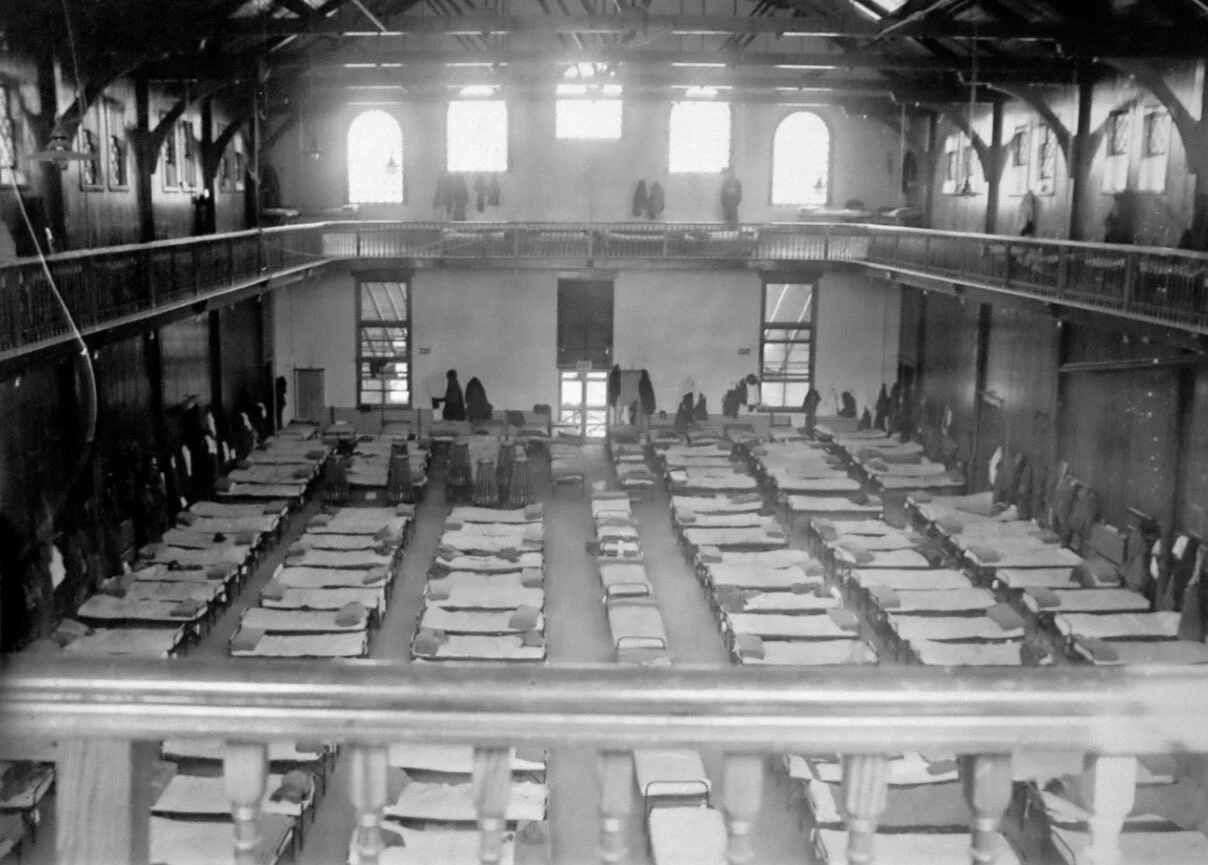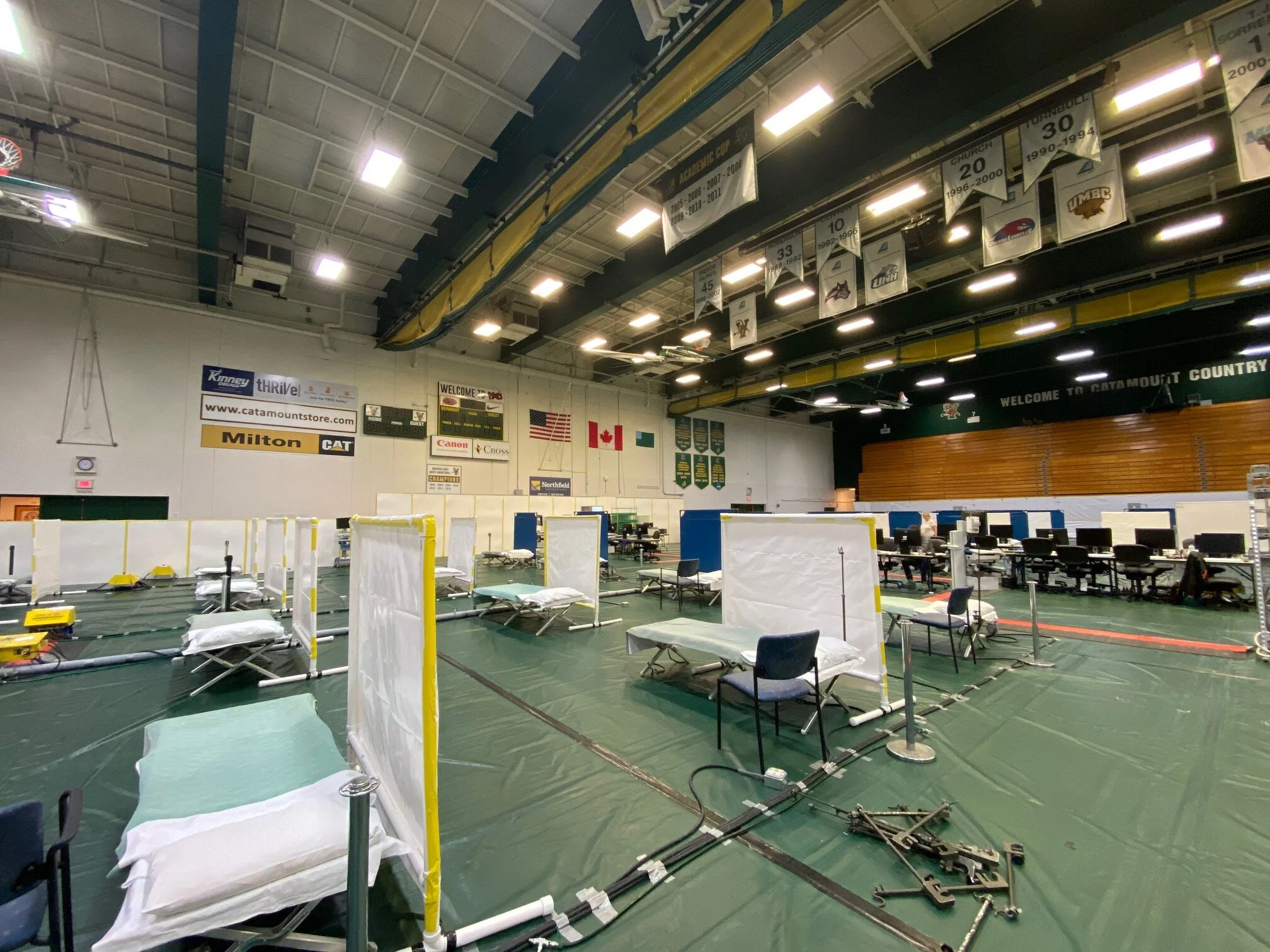COVID-19 prompts remote, unique Match Day for UVM med school class
Given the COVID-19 pandemic, the University of Vermont granted permission for 49 of its 121 finishing medical students at the Larner College of Medicine to graduate early on April 20, allowing them to report to residency training programs early. The move followed an earlier decision at UVM allowing 95 undergraduate nursing students to finish early on May 1 in order to take nursing jobs in health care settings as soon as possible.
The COVID-19 response also will prohibit traditional graduation ceremonies in the coming weeks. Larner Medical School plans a virtual graduation on May 17 inspired by a unique online ceremony held March 20 to mark Match Day for its fourth-year students preparing for the next phase of their medical training.
This report takes a look at how Larner students, staff and faculty improvised to mark a milestone occasion despite social distancing restrictions during the pandemic.
The scene on the screen appears seemingly cut from a sci-fi flick with a familiar NASA logo the dominant image.
A female voice announces: “One minute to launch,” followed by a countdown. “Five, four, three...”
The audio abruptly switches to a man’s voice with background static. “... two, one, zero.”
The last several numbers are from spliced audio taken from the original Apollo launch. President John F. Kennedy’s iconic voice cuts in: “We choose to go to the moon in this decade and do other things, not because they are easy, but because they are hard.”
Upon closer inspection, the inscription around the NASA logo says “UVM Larner College of Medicine.” Below the blue image is the title: “Match Day Mission 2020.”
The scene shifts to a bespectacled man seated in a white lab coat and tie. The wall behind him is covered in blue paper depicting planets and galaxies, more NASA logos are to his right and left.
He looks straight ahead and begins: “Hello Class of 2020, wherever you are in the galaxy…”
Dean Page anchors Mission Control
The man is Dr. Richard L. Page, dean of the University of Vermont’s Larner School of Medicine and he’s addressing the school’s 2020 graduating class.
The occasion is Match Day, a milestone in a doctor’s career when they learn what residency program they have “matched” with to continue their training for the next three to seven years in the specialty of their choice.
This year’s match was scheduled for March 20 which fell under the shadow of COVID-19 with a state of emergency already declared in Vermont a week earlier; gatherings of 10 or more were banned; classes had moved online and a stay-at-home order in effect.
“You might have been wondering, how can we possibly capture the essence of a Larner College of Medicine Match celebration here in the era of COVID-19 and social distancing?” Page says into the camera. “Well, so have we. As it turns out the class of 2020 had already chosen a space mission theme, so we decided to roll with that.”
Page then thanks medical education staff, technical and communications teams for “putting their hearts into” this year’s unique ceremony.
He acknowledges the seriousness of the time in a somber tone. “Now before I start, I need to recognize that these are trying times for all of us. We can’t help but think of those that are sick right now, those that are on the front lines that are caring for them. The families, the friends, all of us are wondering what comes next,” Page says.
He goes on, eyebrows unfurrowing, his tone softening: “This is Match Day. And for a little while today let’s put all those troubles aside. It is time to acknowledge and celebrate the accomplishments of the class of 2020. We owe this to them, their friends, and their families.”
At UVM, Match Day typically features a large assembly with the fourth-year med students. Family and friends are invited as each student gets a turn to open an envelope and read off their match to the class.
The ceremony also is famously quirky -- an opportunity for students and faculty alike to have some fun. There’s usually a theme, even some costumes, Page explains in his introduction, addressing those who might have been experiencing Match Day at UVM for the first time.
“It’s a celebration. It’s a party. There’s a skit … last year there were even a couple of people in tutus,” Page said. “We are serious about the fact that we are physicians. At the same time, one of the things I like about our culture here, even with our culture of professionalism, is that we don’t have to take ourselves too seriously.”
The skit begins
Cut to Ava Bakhtyari, the class president, who appears on screen wearing a white top and necklace adorned with green stones. Smiling, she thanks those participating, talks about how far the class of 2020 has come and explains how the ceremony will work.
The skit begins.
“If you choose to announce your match to the galaxy, remember to tell us your name, what your specialty is, and where you are going,” she says. “Now I was informed we have some special guests today; I think they are from the government. I’m not entirely sure but they seem important.”
The frame switches back to “Mission Control” where Dean Page is joined by Senior Associate Dean for Medical Education Dr. Christa Zehle, and Interim Assistant Dean for Students Dr. Shaden Eldakar-Hein.
They take their seats around a white table, each wearing dark-colored suit coats adorned with the NASA logo and dark sunglasses. The backdrop is a makeshift control panel depicting images of buttons and monitors printed on paper and secured to the wall.
The ceremony gets under way and they call upon those at individual “space stations'' to turn on their video and audio in order to share their real-time experience as they open the email containing their match.
COVID-19 disrupted Match Day nationwide
According to the National Resident Matching Program, more than 40,000 medical students applied to residency programs this year making it the largest match in history. The program reported that 93.7 percent of the applicants matched into a program.
The Association of American Medical Colleges said COVID-19 impacted Match Day events across the country this year as schools canceled in-person ceremonies and turned to online platforms to mark the occasion.
In a Match Day news release, Dr. Atul Grover, executive vice president of the association, said the public health crisis “puts America’s need for well-trained clinicians in stark relief.”
He acknowledged the hastily rearranged ceremonies and congratulated the more than 30,000 young doctors who matched into a residency program. “They enter health care at a time none of us could have imagined when they began this journey,” Grover said.
The approaches varied by school.
For example, the University of Massachusetts Medical School had students open their Match by email and then post their responses online. At the University of Arizona College of Medicine Tucson, students received gift baskets containing their match letter and were asked to upload a 30-second video of their reaction onto Instagram.
At Florida International University Herbert Wertheim College of Medicine, 40 of the 120 students graduating opted to pick up their letters in the university parking lot where deans wearing gloves handed the letters to students.
UVM’s Larner College of Medicine went above and beyond these efforts.
An organizational and IT challenge
The days leading up to Match Day were chaotic, with coronavirus safety concerns constantly shifting, forcing those planning the event to stay on their toes.
Initially it seemed as if organizing the event in small groups might work. Going with the space theme, organizers envisioned splitting students into groups of fewer than 10 each located in multiple separate “space stations” on campus. But health guidelines were changing quickly and soon that plan fell apart.
Working with new guidelines calling for social distancing, organizers scrambled to keep the event alive.
Student Services Coordinator Kiersten Hallquist was the lead organizer, communicating with students as the planning shifted to using a remote medium.
She said her team saw it as a challenge. “We are there to say what the student perspective is. That is what their voice is. And their voice is that they want Match -- Make it happen.”
Hallquist and her team found themselves with their own countdown of less than two weeks to solve the problem. Their goal: Create an experience that could be carried out entirely online.
She stressed how it all came together thanks to incredible collaboration and teamwork from students, faculty, planners, and the deans.
The resulting online production used Zoom webinar technology and was live-streamed on YouTube.
In keeping with the class “Space Mission” theme, ceremony organizers went to work to turn the host location for the event at the medical school into “Mission Control.”
By this time, students had shifted to classes from home. Many had left Burlington and returned to their families and were now scattered across the country.
No problem. As a remote event, they would be able to register their domain as a “space station” and take part in the event.
Hallquist said that 92 of the 121 students in the graduating class decided to participate. That set up a myriad of technical variables to wrangle in order to make this run smoothly, a task that IT specialist Jill Jemison took in stride.
As Director and Chief Information Officer of Health Sciences, it was Jemison’s job with her IT team to decide what technologies would be used, and what the final format would be.
“We probably pulled it all together from inception to delivery in less than two weeks, but more seriously in one week. You do what is asked of you and your team steps up,” she said.
For an event that ran just over 70 minutes, Jemison figured there were at least 20 hours invested in setting up all of the streaming equipment and getting the video platform to function.
Much like a theatrical production -- it had costumes, actors, a set and a script -- next came rehearsal. “Probably somewhere between eight to ten hours of actual practice and making sure the script was all set,” Jemison described.
This practice was critical so each player knew what to do and when and how to do it. There were many opportunities for things to go wrong that fortunately didn’t during the ceremony.
The Mission Control team had to be meticulous in managing the speakers -- muting and unmuting -- to keep a rhythm to the event while connecting individuals to one another from their many locations, some hundreds of miles away.
In the end, there were only a few small hiccups along the way such as tuning in to a student who didn’t realize it was her turn to share -- she was caught on camera dancing for a bit, much to the amusement of the viewers.
Isolated yet intimate
Ironically, this ceremony with students -- called “space cadets” in the skit -- scattered far and wide managed to have a look and feel more intimate than the usual assembly with everyone gathered in one space.
Viewers got to see the students up close in the video frame. Some participated with classmates, partners, children, parents, and even a few with dogs.
As they open their match email “envelopes” in real time, their emotion is easily distinguishable across their faces. Many thanked administrators, teachers and supportive family members during their medical school careers.
Conner Soderquist, seated alongside his wife, who he said was “due any day” -- interrupted by claps and “awwws” on the video call -- explains he was looking to match in family medicine. With his wife looking over his shoulder, he opens the email. “Oh my god - we matched to UMass Medical School,” he says.
Pooja Desai from Boston appears in the frame beside her parents and her partner; her dad holds a phone with her brother watching as she checks her phone and announces to their cheers that she’s matched in general surgery at Albany Medical Center.
James Rohwer balances his toddler daughter on his lap while his wife looks on holding their infant son. “I’m matching in pediatrics,” he says. “Perfect!” replies Dean Page from Mission Control. Rohwer shares that they’re headed for the University of Texas Southwestern Medical School in Dallas.
Embracing the space theme, Gregory Johnston enters the frame in a shiny zip-up silver spacesuit and gleaming blue sunglasses. He announces he’s matched in radiology at UVM, then removes the glasses and apologizes to his mom for bleaching his hair blond. “I was feeling pretty nervous yesterday. I love you, Mom, I’m sorry,” he says.
“This year’s event had a real intimacy to it,” said Elizabeth Dohrman, the Events Manager for the medical school who handled many of the ceremony’s logistics. “We were going into people’s homes to see their reaction in real time when they were opening their match envelopes. That does happen in person, but you aren’t as close to them, and often family members aren’t able to travel to the university.”
Efforts appreciated
Ultimately, the focus of Match Day was the students who are soon to graduate as they near the end of the first stage of their medical training.
Class president Bakhtyari, who matched into neurology at Boston University Medical Center, described how students look forward to Match Day long before it’s their turn to match.
“You are always thinking, OK, three more years and then we will be there; two more years; then next year is going to be the year -- that’s going to be us,” she explained.
“There is stress. There is anxiety. But there is also excitement for what is going to come and what the envelope is going to hold,” Bakhtyari said. “But I think this year there was a lot of uncertainty.”
Knowing Match Day would come during a worldwide pandemic left students wondering if this milestone moment would be overshadowed. They were reassured, Bakhtyari said, when they saw effort going into making it special nonetheless.
“We knew that whatever was to happen, the school would do their best to make sure we had a memorable Match Day. They spent so much time on this and thought about all of the details,” she said.
And as it turns out, the inaugural virtual Match Day may not be the last live-stream celebration the medical school takes on this year. Senior Associate Dean Zehle said it's led to new conversations with students and administrators about the end of the year.
"Having a successful virtual Match Day celebration definitely helped to inform our decision to consider and pursue a virtual graduation," she said.
Watch the full video here:


